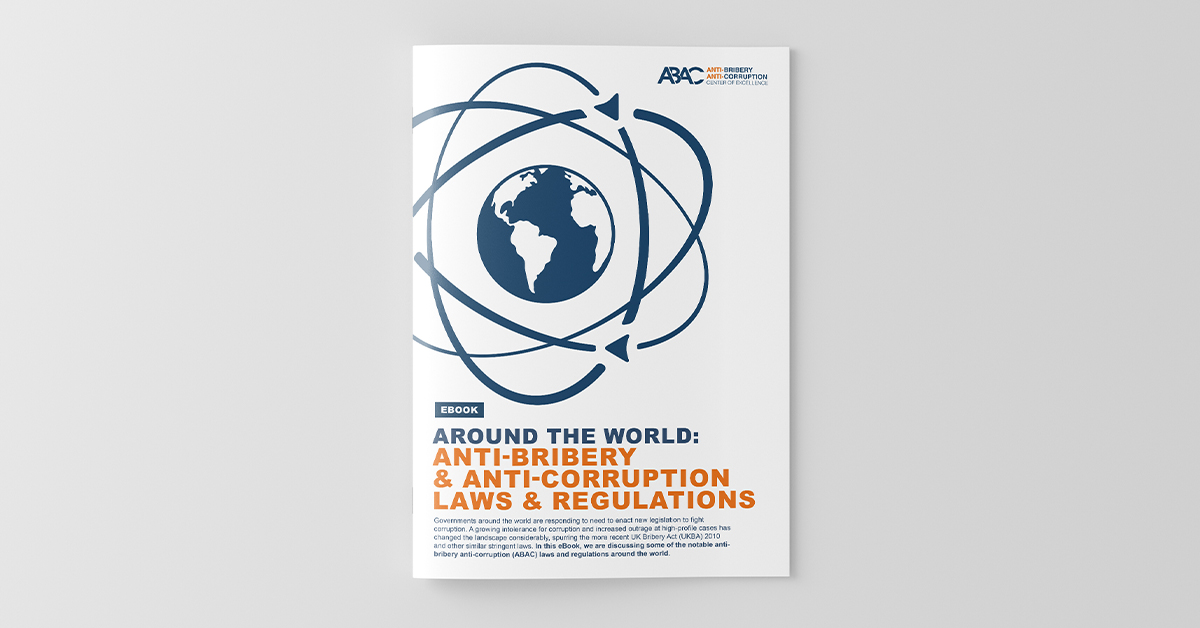In part 1 of this series, we discussed ABAC laws and regulations, including The United Nations Convention against Corruption (UNCAC), European Union Anti-Corruption Conventions, United Kingdom – UK Bribery Act (UKBA) 2010, France – Sapin II. In part two, we looked at other laws and regulations in Germany, Russia, China and Malaysia. In this final part, let’s discuss other important anti-bribery anti-corruption developments in detail.
United States – Foreign Corrupt Practices Act (FCPA)
The FCPA entered into force in 1977, primarily for the purpose of making it unlawful for certain classes of persons and entities to make payments to foreign government officials to assist in obtaining or retaining business. The anti-bribery provisions of the FCPA prohibit “the willful use of the mails or any means of an instrumentality of interstate commerce corruptly in furtherance of any offer, payment, promise to pay, or authorisation of the payment of money or anything of value to any person, while knowing that all or a portion of such money or thing of value will be offered, given or promised, directly or indirectly, to a foreign official to influence the foreign official in his or her official capacity, induce the foreign official to do or omit to do an act in violation of his or her lawful duty, or to secure any improper advantage in order to assist in obtaining or retaining business for or with, or directing business to, any person,” according to the U.S. Dept. of Justice.
Amendments to the FCPA in 1998 extended the anti-bribery provisions to “foreign firms and persons who cause, directly or through agents, an act in furtherance of such a corrupt payment to take place within the territory of the United States.”
Canada – Corruption of Foreign Public Officials Act (CFPOA)
The Canadian Corruption of Foreign Public Officials Act (CFPOA) came into force in 1998, fulfilling its obligations under the UN Convention against Corruption. The CFPOA states that: “Every person commits an offence who, in order to obtain or retain an advantage in the course of business, directly or indirectly gives, offers or agrees to give or offer a loan, reward, advantage or benefit of any kind to a foreign public official or to any person for the benefit of a foreign public official as consideration for an act or omission by the official in connection with the performance of the official’s duties or functions” or “to induce the official to use his or her position to influence any acts or decisions of the foreign state or public international organisation for which the official performs duties or functions.”
Are you in a hurry or interested in more in-depth information? Just download our new ABAC Laws and Regulations Around the World Playbook now! Our Playbook goes into each of the laws and regulations and discusses the importance, mechanisms and action points to each.
African Union Convention on Preventing and Combating Corruption
The African Union Convention on Preventing and Combating Corruption came into force in 2006. The convention criminalises bribery, both in domestic and foreign cases, along with “trading in influence,” money laundering and offences. It was conceived to address bribery and corruption across the whole of the African continent, creating a consensus on preventing and punishing illicit acts described in the convention. By adopting the convention, the signatories are required to open investigations and prosecute corruption to further international cooperation and promote asset recovery.
Brazil – Anti-Corruption Act (Clean Company Act)
The Brazilian Anti-Corruption Act (Law No. 12,846), also known as the Clean Company Act, came into force in 2014. According to GAN, the law “holds companies responsible for the corrupt acts of their employees and introduces strict liability for those offenses, meaning a company can be liable without a finding of fault. The Act provides strict civil and administrative penalties but no criminal penalties for companies. However, the Criminal Code establishes domestic criminal offences. … Penalties for companies under the Act include fines of up to 20% of a company’s gross revenue from the previous year or suspension or dissolution of a company. Importantly, prosecutors are not required to prove a company’s representatives acted with criminal or corrupt intent, and companies are not afforded a legal defense for implementing ‘adequate procedures’ to prevent corrupt acts.”
Conclusion
No matter where your organisation conducts business around the world, you are likely under the jurisdiction of one or more of the above pieces of legislation, or others. The possibility of fines, imprisonment, or worse (such as in China) should motivate every business leader to enact compliance measures and stay within the letter of the law when it comes to bribery and compliance.
ISO 37001 Anti-bribery Management Systems standard outlines the fundamental elements needed to establish anti-bribery anti-corruption compliance. Engage ABAC® Certification’s expert ISO 37001:2016 training and certification in order to prevent and detect bribery and corruption and remain in compliance. Learn more about ABAC Certification and ISO 37001:2016 Anti-Bribery Management System today.
Stay connected for more on local and regional compliance or anti-bribery and anti-corruption laws and regulations by signing up to our newsletter!
About ABAC® Center of Excellence
ABAC® is an independent certification body powered by CRI Group. ABAC® Center of Excellence offers a complete suite of services and solutions designed to educate, equip & support the world’s leading business organisations with the latest best-in-practice risk & performance assessments, systems improvement & standards certification. ABAC® programs protect your organisation from damaging litigation & safeguard your business in the global marketplace by providing certification & training in internationally recognised ISO standards, such as ISO 37001 Anti-Bribery Management Systems, ISO 19600 Compliance Management Systems and ISO 31000 Risk Management Systems.
GET A FREE QUOTE or CONTACT US to discuss your anti-bribery, risk and compliance needs.




[…] three-part article series: “ABAC Laws and Regulations Around the World” Part 1, Part 2 and Part 3 we are proud to announce the launch of this playbook. ABAC Laws and Regulations Around the World […]